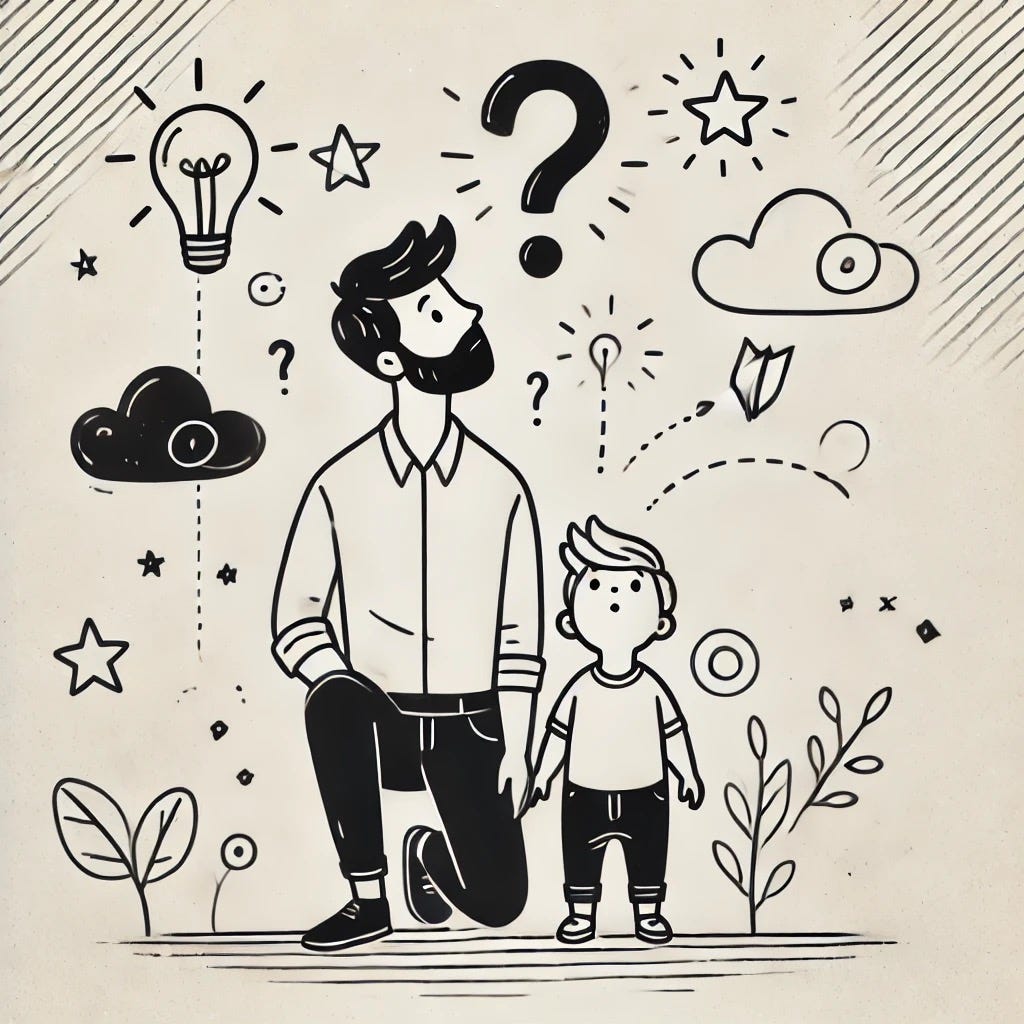“In the beginner’s mind there are many possibilities; in the expert’s mind, there are few.”
– Shunryu Suzuki
Fatherhood has taught me many things I wasn’t expecting—patience, resilience, the value of a good night’s sleep. But perhaps one of the most surprising lessons has been the strength of saying, “I don’t know.”
Growing up, we’re conditioned to think that being a parent means having answers. The image of a “good father” often feels like a cross between a superhero and a sage: all-knowing, dependable, capable of navigating life’s twists with unwavering confidence. And maybe it’s true that some dads seem to have it all figured out, but that hasn’t been my experience. If anything, the closer I look, the more I realize that fatherhood isn’t about knowing—it’s about learning.
Saying “I don’t know” used to feel like a weakness. After all, wasn’t my job to guide, to teach, to be the one who always has an answer? But over time, I’ve come to see those three words differently. When my kids ask a question I don’t have an answer to—something simple like why the sky changes colors or why people are mean—I’ve learned that admitting I don’t know is powerful. It’s a bridge to something greater than just knowledge.
Building Curiosity, Not Certainty
In our world, there’s pressure to be certain, to present answers and avoid ambiguity. Yet, curiosity thrives in uncertainty. When I tell my kids, “I don’t know, let’s find out together,” it opens a door. It shows them that learning isn’t something we stop doing as adults. It’s a lifelong adventure. And, in those moments, they see me as more than just their dad—they see me as a fellow explorer, someone who’s also navigating this big, beautiful, messy world with an open mind.
I hope my kids grow up knowing that it’s okay to have questions, that they don’t need to feel ashamed of what they don’t know. Curiosity is a gift that many of us lose as we grow up, but I’d like to think it’s something I can help them keep.
Redefining Strength and Humility
There’s strength in admitting limits. If fatherhood has taught me one thing, it’s that I don’t need to be perfect to be a good parent. What I need to be is present. When I say “I don’t know,” I’m showing them humility—that it’s okay to not have it all figured out, that sometimes we have to approach life’s questions with humility and an open heart. It’s a lesson in being human, in being real, and I think they appreciate that.
In a way, saying “I don’t know” allows me to model a kind of strength that’s rare but valuable. It’s not a strength that intimidates or controls; it’s a strength that embraces the unknown and is willing to walk with them into it, hand in hand.
A Space for Wonder
At the end of the day, I don’t want my kids to grow up seeing the world as a place with fixed answers, but as one full of wonder. Sometimes we’ll find answers, and sometimes we’ll realize that the answer doesn’t matter as much as the journey to find it. I want them to know that curiosity, humility, and a willingness to learn will serve them far better than the illusion of certainty.
And so, if there’s one thing I hope they remember when they’re grown, it’s not the answers I gave them but the times we explored the questions together.





Totally Agree. I don't know opens doors. When my first was born I do remember having a distinct conversation with myself. I was walking back from work one day, Ettan was around 5 months and it came to me that now that I'm a father I should have a better idea of who I am. Essentially I should, with more intentionality, get to know myself better. That was an important 'note to self' and has helped me in my fatherhood journey.